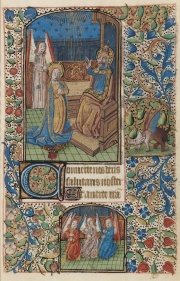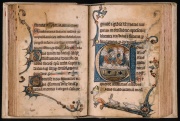Parchment
Jump to navigation
Jump to search
Description
A thin writing or drawing sheet prepared from the skin of a sheep or goat. Parchment was used as early as 2nd century BCE in Rome and the Near East. The skin is dehaired with lime then scraped, rubbed, and polished with abrasives (Pumice) and fillers (Chalk or Talc) on one side to provide a smooth writing surface. Thin translucent sheets of parchment made from stillborn or newly born calves or lambs are called Vellum. They are used for documents, fine books, drum heads, and lamp shades. The term parchment is sometimes applied to modern paper (wood pulp) products with that are finished to imitate the appearance of vellum or parchment (see Vegetable parchment).
Synonyms and Related Terms
parchemin (Fr.); pergaminho (Port.); drumhead leather
Risks
- Adversely affected by moisture and high humidities.
- Susceptible to biodeterioration.
Resources and Citations
- R.Reed, Ancient Skins, Parchments and Leathers Seminar Press, London & New York, 1972
- Peter Rück (ed), Pergament, Geschichte-Strucktur-Restaurierung-Herstellung, Sigmaringen, Jan Thorbecke Verlag, 1991. (German)
- R. J. Gettens, G.L. Stout, Painting Materials, A Short Encyclopaedia, Dover Publications, New York, 1966
- Ralph Mayer, A Dictionary of Art Terms and Techniques, Harper and Row Publishers, New York, 1969 (also 1945 printing)
- Matt Roberts, Don Etherington, Bookbinding and the Conservation of Books: a Dictionary of Descriptive Terminology, U.S. Government Printing Office, Washington DC, 1982
- Encyclopedia Britannica, http://www.britannica.com Comment: "parchment" [Accessed October 31, 2001
- Silvie Turner, Which Paper?, Design Press, New York, 1991
- Tom Rowland, Noel Riley, A-Z Guide to Cleaning, Conserving and Repairing Antiques, Constable and Co., Ltd., London, 1981

